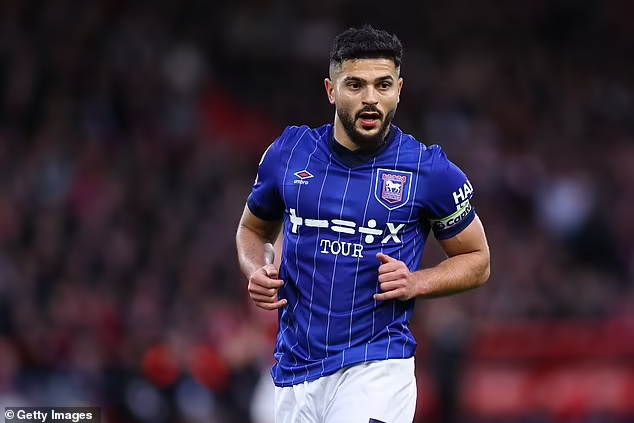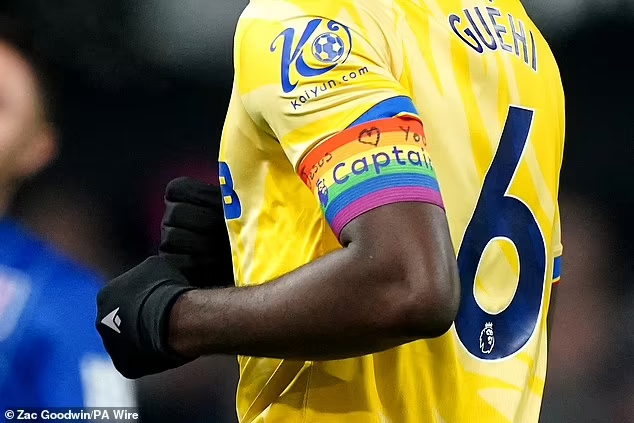Crystal Palace captain Marc Guehi has once again courted controversy by writing a religious message on his rainbow armband during a Premier League match, defying Football Association (FA) regulations. Guehi, who inscribed “Jesus loves you” during his side’s victory over Ipswich Town on Tuesday night, had already been reprimanded for a similar act days earlier when he wrote “I love Jesus” during a match against Newcastle United.
The FA has reiterated its stance on such actions, reminding clubs and players of the rules regarding slogans and statements on equipment. However, the governing body has decided not to take further action against Guehi or Crystal Palace.
FA’s Regulations on Armbands
The FA permits slogans and emblems that promote football, respect, and integrity but prohibits political, religious, or personal messages. Captains are required to wear an armband that complies with Law 4 of the game, which mandates that no unauthorized slogans, statements, or imagery be displayed.
The FA formally warned Crystal Palace and Guehi after his first infraction but opted against escalating the matter after his repeat action. While no formal sanctions have been imposed, the situation highlights the delicate balance between personal expression and regulatory compliance in professional football.
Guehi’s Actions and Manager’s Defense
Marc Guehi’s messages come during the Premier League’s participation in the Rainbow Laces campaign, an initiative launched in 2013 to support the LGBTQ+ community and promote inclusivity within the sport. While Guehi’s religious inscriptions have sparked debate, Crystal Palace manager Oliver Glasner defended his captain, emphasizing his respectfulness and maturity.
“We respect every single player, especially Marc, who is our captain. He is a great guy, very humble, and we shouldn’t make this bigger than it is,” Glasner stated after the Ipswich match. “Marc is very respectful to everyone at the club. He has his opinion, and we accept and respect every opinion.”
Glasner highlighted the overarching aim of the Rainbow Laces campaign—tolerance and inclusivity—and maintained that Guehi embodies those values despite the controversy surrounding his actions.
The Rainbow Laces Campaign
The Rainbow Laces campaign seeks to foster an environment of acceptance and solidarity with the LGBTQ+ community in football. By wearing rainbow-themed captain’s armbands, players and clubs send a visible message of support for inclusivity in a sport that has historically faced challenges in combating discrimination.

Guehi is among 19 Premier League captains who donned the rainbow armband during the campaign’s game week. However, Ipswich Town captain Sam Morsy, citing religious beliefs, declined to participate. Ipswich manager Kieran McKenna defended Morsy’s decision, underscoring the club’s commitment to inclusivity while respecting individual choices.
“We want to be an inclusive club and are working really hard on that,” McKenna said. “At the same time, the club has respected Sammy’s individual decision based on his religious beliefs.”
Reactions and Public Debate
Guehi’s decision has sparked a range of reactions, with some praising his courage in expressing his faith and others criticizing him for detracting from the campaign’s message. The incident raises questions about the intersection of personal beliefs and collective efforts to promote inclusivity in football.
| JUST IN: FA will NOT charge Marc Guehi for having message “I love Jesus” on his rainbow armband but will remind him that religious messages are prohibited.
[@martynziegler] pic.twitter.com/tCVwo3MVfs
— CentreGoals. (@centregoals) December 3, 2024
The FA’s measured response—opting for reminders rather than penalties—has been seen by some as a pragmatic approach to avoid escalating tensions. However, it also sets a precedent that may encourage further individual expressions on armbands, challenging the uniformity the campaign seeks to achieve.
Broader Implications for Football
The controversy highlights the challenges football faces in navigating cultural and religious diversity while promoting initiatives aimed at inclusivity. While the Rainbow Laces campaign has been widely lauded for its impact, the differing perspectives of players like Guehi and Morsy underscore the complexities of implementing such initiatives in a multicultural sport.
For the FA, striking a balance between enforcing regulations and respecting players’ rights to personal expression remains an ongoing challenge. The governing body’s decision to refrain from punitive measures in Guehi’s case reflects a nuanced approach to a sensitive issue.
Guehi’s Leadership and Faith
As Crystal Palace captain, Marc Guehi has been lauded for his leadership and professionalism on the pitch. His recent actions, however, have thrust him into the spotlight for reasons beyond his footballing abilities. While his inscriptions have drawn criticism, they also highlight his willingness to stand by his convictions—a trait that has earned him admiration from certain quarters.
The incident serves as a reminder of the diverse beliefs and values that coexist within the football community, prompting broader conversations about how the sport can accommodate and respect these differences while fostering inclusivity.
Future Actions and Campaign Legacy
The Rainbow Laces campaign has been a vital tool in addressing discrimination and promoting equality in football. As the initiative continues to evolve, so too will the conversations around how best to implement its message while respecting the diverse backgrounds of players.
The FA’s handling of Marc Guehi’s actions will likely serve as a case study in managing similar situations in the future. For now, the focus remains on how football can balance its push for inclusivity with the individual expressions of its players.
READ NEXT:
- Premier League Midweek Thrills: Salah’s Brilliance, De Bruyne’s Masterclass, Chelsea’s Resurgence & More
- Arsenal End Ruben Amorim’s Unbeaten Start at Manchester United: 5 Key Takeaways
- Gor Mahia Moves Closer to FKF Premier League Leaders KCB with 3-2 Win Against Talanta
- Premier League Sack Race Heats Up: O’Neil, Lopetegui, and Martin Under Pressure


